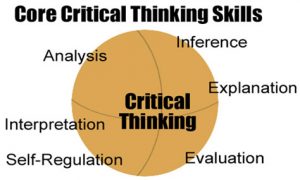One of the most common phrases that you’ll hear when you get to college is “thinking critically.” Professors always list that as an object of their classes, and many universities list it in their mission statements. You’ll see it on course descriptions, syllabi, and assignment. If you’re really lucky, one of your professors will explain what they think it means—if not, you’ll be left to figure it out on your own. That’s why we’ve provided the following guide to thinking critically in college.
The first step in thinking critically about an issue is to form your opinion of the issue. You can go with your first reaction on this. For instance, if I asked you, “Is it better to act in the best interest of yourself or in the best interest of a group?” you would probably answer very quickly. You can start with this first answer. The issues presented in college classes are usually more complicated than this, but it will serve as an example.
Once you’ve settled on a view, you can start to ask questions about the issue. Ask yourself why you think the way you do. Is it because of how you were raised? How society has formed your opinions of right and wrong? Is it an issue that becomes less clear when encountered in the real world? Try to think of any situations, questions, or problems that may make the issue more complicated. Write down as many as you can think of.
After you have a long list of complicating questions and problems, you can begin to try to answer them in relation to your original issue. Start applying your opinion to different real-world cases and see if it holds up. You might find that things aren’t as clear as they seem at first. This is what critical thinking is all about—thinking about an issue from every angle that you can come up with. As you analyze the issue, write down other questions that arise, and continue on to complete the same process with these questions.
Thinking critically is a long process of developing complications. The objective of this process is to fully develop an opinion or a stance on an issue that can be effectively defended against questioning. By developing this long list of questions, you can be sure that you’ve thought of as many weak points in your argument as possible and that you’re prepared to address them.
To be as effective as possible, it’s recommended that you write down all of your questions and answers. It will help you remember your thought processes and will give you a reference when you go back and read through the list. Another advantage of documenting this process is for writing papers—once you’ve gone through listing your opinions, questions, complications, answers, and resulting questions, you’ll have a solid outline for your paper already written.
Thinking critically in college is an essential skill, and one that only comes with practice. Taking classes like philosophy and English will hone your critical thinking skills and ensure that you become an expert in the field. Don’t get frustrated with it—be patient and work hard, and you’ll quickly find that you’re a step ahead of the game.

